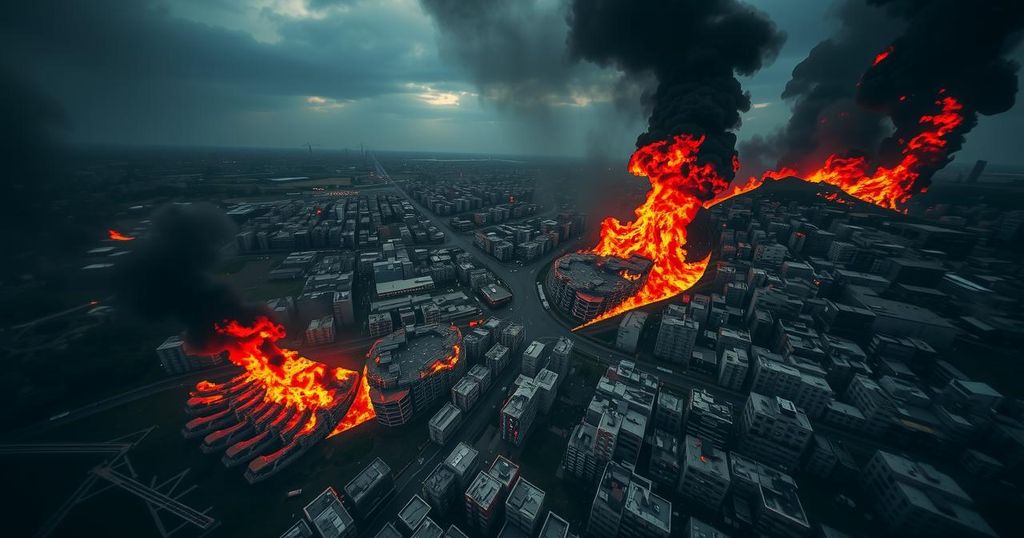The Gaza conflict, now in its 379th day, sees ongoing Israeli military operations causing significant civilian casualties, including recent strikes in Jabalia. The death toll has risen dramatically, and international leaders are advocating for a ceasefire and humanitarian access. Simultaneously, tensions in Lebanon continue to escalate, with Hezbollah responding to Israeli military actions, contributing to a complex regional conflict. Prime Minister Najib Mikati emphasizes the urgent need for a ceasefire and adherence to international resolutions.
The conflict in Gaza has now reached its 379th day, characterized by relentless assaults from Israeli forces and a continued siege on northern Gaza. A recent airstrike on the Jabalia refugee camp led to significant civilian casualties, including many women and children. The Israeli military has escalated both air and ground operations in this area and has deployed additional troops, indicating a potential worsening of the situation. In the last 24 hours, the Gaza Ministry of Health reported the occurrence of three massacres, with 19 fatalities and 91 injuries recorded during this period alone. Since the onset of hostilities on October 7, 2023, fatalities in Gaza have tragically increased to 42,519, accompanied by nearly 100,000 injuries. Amidst the violence, communication networks have been disrupted in northern Gaza, which Hamas has interpreted as an attempt to further isolate Palestinians and obscure the actions of the Israeli forces. Many Palestinians remain trapped in their homes in Jabalia camp, steadfastly resisting evacuation orders amidst the ongoing ground attacks. In a significant announcement, Hamas reported the assassination of its leader, Yahya Sinwar, even as various nations expressed hopes for a negotiated ceasefire. Notably, leaders from the United States, France, Germany, and the United Kingdom emphasized the urgency of halting the conflict and facilitating humanitarian aid to civilians. In parallel, the UN’s independent investigator on the right to food, Michael Fakhri, reported that Israel continues to enforce a ‘starvation campaign’ in Gaza, despite having provided substantial aid to the Strip over the past year. On the military front, the Al-Quds Brigades, affiliated with the Islamic Jihad movement, successfully targeted an Israeli military vehicle, while Hamas’ Qassam Brigades also engaged Israeli forces with missile strikes on their machinery in Jabalia. In Lebanon, tensions have escalated, with the Israeli military intercepting drones launched from its territory and responding with air raids, particularly in the southern region and the Bekaa Valley. Hezbollah has claimed responsibility for multiple strikes against northern Israeli cities. Furthermore, Lebanese Prime Minister Najib Mikati underscored the necessity of a ceasefire and reaffirmed Lebanon’s adherence to international resolutions governing the conflict.
The ongoing Israel-Gaza conflict has persisted for over a year, resulting in extensive civilian casualties and severe humanitarian crisis. This period has witnessed intensified military operations on both sides, with significant international concern regarding violations of humanitarian law and the protection of civilians. The complex geopolitical landscape has drawn reactions from various world leaders advocating for ceasefire and humanitarian access. The situation extends to neighboring Lebanon, complicating the regional dynamics as armed conflict spills across borders, with Hezbollah engaging in confrontations against Israeli forces.
The conflict in Gaza and Lebanon is marked by a tragic loss of civilian life and an ongoing humanitarian crisis. The continued military actions and airstrikes illustrate the escalation in hostilities, while the international community calls for an immediate ceasefire to prioritize the safety and wellbeing of civilians caught in the line of fire. The dire circumstances necessitate a comprehensive approach to conflict resolution and adherence to international humanitarian law to safeguard those most affected by the violence.
Original Source: www.dailynewsegypt.com







